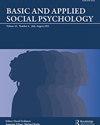我更不喜欢圣诞晚餐上的你!即将到来的国家或宗教节日的偏见程度
IF 1.8
3区 心理学
Q2 PSYCHOLOGY, SOCIAL
引用次数: 4
摘要
摘要在许多进行的心理学研究中,已经证明,对少数群体的态度可能会在竞选活动、恐怖袭击或街头骚乱的影响下发生变化。在本文提出的第一项研究中,我们调查了在国家和宗教节日之前的一段时间内,对穆斯林的偏见程度是否有所增加。人们认为,在这一时期,身份问题受到重视,这可能会强化对不属于“我们”类别的外部群体的负面态度。这项研究是按照遗失信件的程序进行的。事实证明,在国定假日之前的这段时间里,对穆斯林的偏见有所增加,在圣诞节之前的这一段时间里更是如此。在第二项研究中,我们激活了民族或天主教性质的概念的可及性,之后我们测量了反穆斯林的偏见。事实证明,宗教性质的激活内容(在一定程度上)影响了偏见的激活,而在激活民族性质的内容方面,我们没有记录这种影响。本文章由计算机程序翻译,如有差异,请以英文原文为准。
I like You Even Less at Christmas Dinner! Prejudice Level as a Function of an Approaching National or Religious Holiday
Abstract In many conducted psychological studies, it has been demonstrated that attitudes towards minority groups can change under the influence of electoral campaigns, as well as terrorist attacks, or street riots. In the first study presented in this article, we have examined whether the level of prejudice towards Muslims increases during the period preceding national and religious holidays. It was assumed that during such periods, issues of identity are accented, which may reinforce negative attitudes towards an external group not included in the category of “we”. The study was carried out following the lost letter procedure. It turned out that the prejudices thus operationalized against Muslims grew modestly in the period preceding a state holiday, and much more so in the period preceding Christmas. In the second study we activated accessibility of concepts of a national or Catholic nature, after which we measured anti-Muslim prejudices. It turned out that activated content of a religious nature influences (to a small degree) the activation of prejudices, while in respect of activation of content of a national character we did not record such an impact.
求助全文
通过发布文献求助,成功后即可免费获取论文全文。
去求助
来源期刊

Basic and Applied Social Psychology
PSYCHOLOGY, SOCIAL-
CiteScore
4.50
自引率
12.50%
发文量
7
期刊介绍:
Basic and Applied Social Psychology (BASP) emphasizes the publication of outstanding research articles, but also considers literature reviews, criticism, and methodological or theoretical statements spanning the entire range of social psychological issues. The journal will publish basic work in areas of social psychology that can be applied to societal problems, as well as direct application of social psychology to such problems. The journal provides a venue for a broad range of specialty areas, including research on legal and political issues, environmental influences on behavior, organizations, aging, medical and health-related outcomes, sexuality, education and learning, the effects of mass media, gender issues, and population problems.
 求助内容:
求助内容: 应助结果提醒方式:
应助结果提醒方式:


